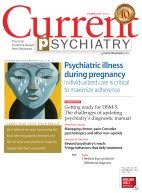Monday, August 3, 2009
How to reduce distress and repetitive behaviors in patients with OCD
Elna Yadin, PhD
Research associate, Center for Treatment and Study of Anxiety, Department of psychiatry, University of Pennsylvania, Philadelphia, PA
Edna B. Foa, PhD
Professor and director, Center for Treatment and Study of Anxiety, Department of psychiatry, University of Pennsylvania, Philadelphia, PA
Exposure and response (or ritual) prevention has been shown to be effective in improving the therapeutic outlook for patients with obsessive-compulsive disorder (OCD). Yet barriers—including patient unwillingness to enter into the intensive therapy—prevent more persons with OCD from achieving an improved quality of life.
This article focuses on the clinical picture of OCD and the multifaceted cognitive-behavioral therapy (CBT) that has received the most empirical support. We also describe initiatives to make CBT more accessible to OCD patients, such as providing twice-weekly instead of daily treatment sessions.
Read full text (free access)
Comment on this article
Email the editor
Subscribe to:
Post Comments (Atom)


No comments:
Post a Comment